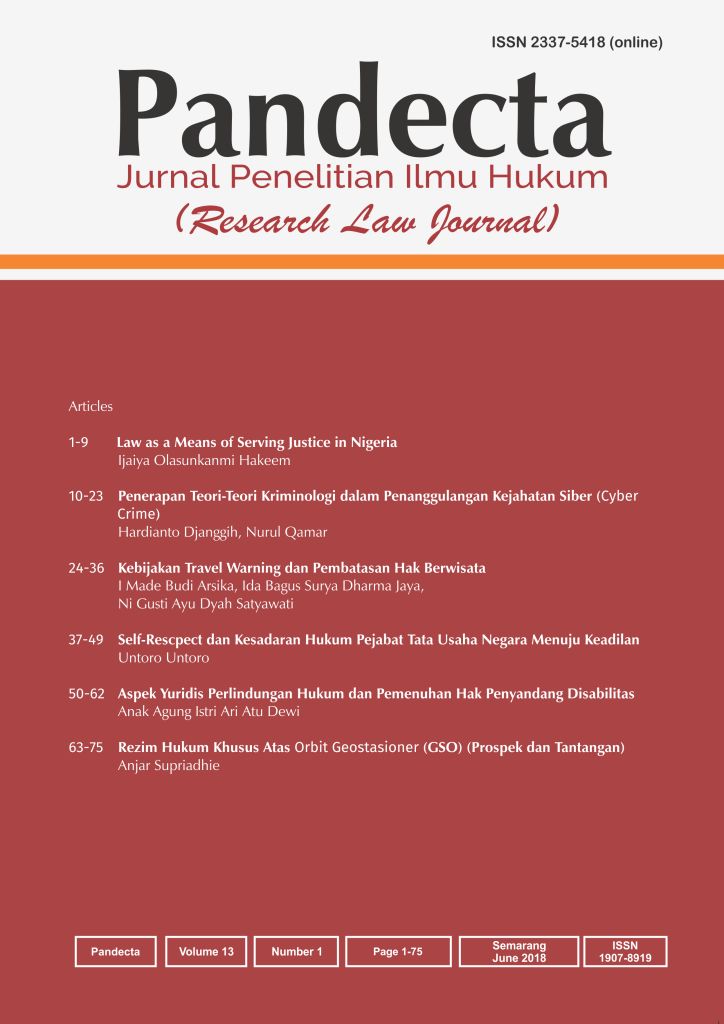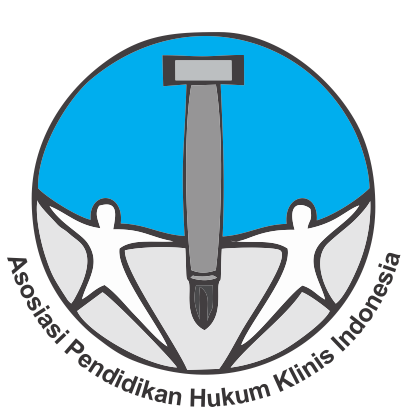The Future of Corruption’s Handling in the Regions and The Application of Restorative Justice
(1) Faculty of Law, Universitas Sebelas Maret, Indonesia
(2) Faculty of Law, Universitas Sebelas Maret, Indonesia
Abstract
Corruption is the biggest obstacle in implementing the development process, and until now, it has yet to be appropriately resolved although various models of retributive punishment have been applied. As a result, tThe losses suffered by the state continue to increase, and as a consequence, people cannot enjoy public facilities as they should. Cooperation between the Police, the Attorney General’s Office, and the Ministry of Home Affairs, which forms coordination between Aparat Pengawas Intern Pemerintah (APIP) and Aparat Penegak Hukum (APH), is a way to prevent corruption at the local government level. Criminal sanctions and imprisonment are no longer the main options for the government to deal with corruption problems in the regions. This choice then raises the pros and cons of the people who so far only recognize the existence of retributive justice as a form of criminal sanction. This study was made using the theory of consequentialism from Jeremy Bentham, and the Restorative Justice Theory put forward by John Braithwaite to provide an overview of the solutions used by APIP in preventing corruption in the regions. The doctrinal research method with a statutory approach will show the impact of the application of restorative justice on corruption practices in the regions. From this study, it can be seen that the restorative justice used by APIP can minimize losses suffered by the state and, at the same time, provide a deterrent effect for perpetrators of corruption.
Full Text:
PDFReferences
Aulia, M. Zulfa. “Hukum Pembangunan Dari Mochtar Kusuma-Atmadja: Mengarahkan Pembangunan Atau Mengabdi Pada Pembangunan?” Undang: Jurnal Hukum 1, no. 2 (March 11, 2019): 363–92. https://doi.org/10.22437/ujh.1.2.363-392.
Bakri, Abdul Mahsyar, and Ihyani Malik. “Kapabilitas Aparat Pengawas Intern Pemerintah Di Inspektorat Daerah Kabupaten Talakar.” JPPM: Journal of Public Policy and Management 1, no. 2 (November 2019).
Bentham, Jeremy. The Principles of Morals and Legislation. Great Books in Philosophy Series. Buffalo, N.Y: Prometheus Books, 1988.
Boateng, Francis D. “Perceived Police Fairness: Exploring the Determinants of Citizens’ Perceptions of Procedural Fairness in Ghana.” Policing and Society 30, no. 9 (October 20, 2020): 985–97. https://doi.org/10.1080/10439463.2019.1632311.
Byrd, B.Sharon. Kant and Law. First edition. Routledge, 2017.
Canton, Rob, and Nicola Padfield. “Why Punish?” The Howard Journal of Crime and Justice 58, no. 4 (December 2019): 535–53. https://doi.org/10.1111/hojo.12342.
Card, Dallas, and Noah A. Smith. “On Consequentialism and Fairness.” Frontiers in Artificial Intelligence 3 (May 8, 2020): 34. https://doi.org/10.3389/frai.2020.00034.
Cindy Mutia Annur. “10 Provinsi Dengan Laporan Kasus Korupsi Terbanyak Pada 2021,” January 17, 2023. https://databoks.katadata.co.id/datapublish/2023/01/17/10-provinsi-dengan-laporan-kasus-korupsi-terbanyak-pada-2021.
Divisi Hukum dan Monitoring Peradilan ICW. “Hasil Pemantauan Tren Penindakan Kasus Korupsi Tahun 2021.” Jakarta: ICW, April 2022. https://antikorupsi.org/sites/default/files/dokumen/Tren%20Penindakan%202021.pdf.
Gade, Christian B. N. “Is Restorative Justice Punishment?” Conflict Resolution Quarterly 38, no. 3 (March 2021): 127–55. https://doi.org/10.1002/crq.21293.
Gustafsson, Johan E. “Bentham’s Binary Form of Maximizing Utilitarianism.” British Journal for the History of Philosophy 26, no. 1 (January 2, 2018): 87–109. https://doi.org/10.1080/09608788.2017.1347558.
Jefirstson Richset Riwukore, Hilda Manafe, Fellyanus Habaora, Yohanes Susanto, and Tien Yustini. “Strategi Pencegahan Dan Pemberantasan Korupsi Di Pemerintah Kota Kupang, Provinsi Nusa Tenggara Timur.” Aspirasi: Jurnal Masalah-Masalah Sosial 11, no. 2 (Desember 2020).
Jessica Lynn Corsi. “An Argument for Strict Legality in International Criminal Law.” Georgetown Journal of International Law 49 (2018): 1322.
John Braithwaite. “Principles of Restorative Justice.” Edited by A. von Hirsch, J.V. Roberts, A.E. Bottoms, K. Roach, and M. Schiff. Hart Publishing 1 (2003): 1–20.
John Braithwaite. “Restorative Justice.” In Handbook of Crime and Punishment, edited by Michael H Tonry. USA: Oxford University Press, 2015.
John Braithwaite. Restorative Justice & Responsive Regulation. New York: Oxford University Press, 2002.
Kai Ambos. “Ius Puniendi and Constitution: A Comparative (Canadian-German) Perspective.” Vienna Journal on International Constitutional Law 14 (2021): 253–87.
Kant, Immanuel, Mary J. Gregor, and Jens Timmermann. Groundwork of the Metaphysics of Morals. Revised edition. Cambridge Texts in the History of Philosophy. Cambridge: Cambridge University Press, 2012.
Martin, Rose, Petko Kusev, Joseph Teal, Victoria Baranova, and Bruce Rigal. “Moral Decision Making: From Bentham to Veil of Ignorance via Perspective Taking Accessibility.” Behavioral Sciences 11, no. 5 (May 1, 2021): 66. https://doi.org/10.3390/bs11050066.
McElwee, Brian. “The Ambitions of Consequentialism.” Journal of Ethics and Social Philosophy 17, no. 2 (December 13, 2019). https://doi.org/10.26556/jesp.v17i2.528.
Muhamad Ali Zaidan. “Sociological Approach to Eradication Corruption In Indonesia (Alternative to Imprisonment).” Pandecta 12, no. 1 (June 2017).
Noveria Devy Irmawanti and Barda Nawawi Arief. “Urgensi Tujuan Dan Pedoman Pemidanaan Dalam Rangka Pembaharuan Sistem Pemidanaan Hukum Pidana.” Jurnal Pembangunan Hukum Indonesia 3, no. 2 (2021): 217–27.
Pratama, Nova Indra. “Mekanisme Koordinasi Dalam Penanganan Tindak Pidana Korupsi (Studi Di Kepolisian Resort Kota Besar Medan).” Airlangga Development Journal 5, no. 2 (December 9, 2021): 80. https://doi.org/10.20473/adj.v5i2.31901.
Puteri Hikmawati. “Pidana Pengawasan Sebagai Pengganti Pidana Bersyarat Menuju Keadilan Restoratif.” Negara Hukum: Membangun Hukum Untuk Keadilan Dan Kesejahteraan 7, no. 1 (June 2016).
Shuster, Arthur. “Kant on the Role of the Retributive Outlook in Moral and Political Life.” The Review of Politics 73, no. 3 (2011): 425–48. https://doi.org/10.1017/S0034670511003433.
Syaputra. “Implikasi Perumusan Delik Korupsi Dalam Kebijakan Pembaharuan Kitab Undang-Undang Hukum Pidana.” Fiat Justisia Jurnal Ilmu Hukum 9, no. 3 (September 2015): 353–64.
Udoudom, Mfonobong David, Samuel Akpan Bassey, Okpe Okpe, and Timothy Adie. “Kantian and Utilitarian Ethics on Capital Punishment.” Budapest International Research and Critics Institute (BIRCI-Journal): Humanities and Social Sciences 2, no. 2 (May 10, 2019): 28–35. https://doi.org/10.33258/birci.v2i2.234.
Venkatesh, Nikhil. “Is Act-Consequentialism Self-Effacing?” Analysis 81, no. 4 (February 10, 2022): 718–26. https://doi.org/10.1093/analys/anab042.
Wardhani, Lita Tyesta Addy Listya, Muhammad Dzikirullah H Noho, and Aga Natalis. “The Adoption of Various Legal Systems in Indonesia: An Effort to Initiate The Prismatic Mixed Legal Systems.” Cogent Social Sciences 8, no. 1 (December 31, 2022): 2104710. https://doi.org/10.1080/23311886.2022.2104710.
West, Robin. “Classical Criminology.” In The Wiley-Blackwell Encyclopedia of Social Theory, edited by Bryan S Turner, 1–4. Oxford, UK: John Wiley & Sons, Ltd, 2017. https://doi.org/10.1002/9781118430873.est0591.
Refbacks
- There are currently no refbacks.


